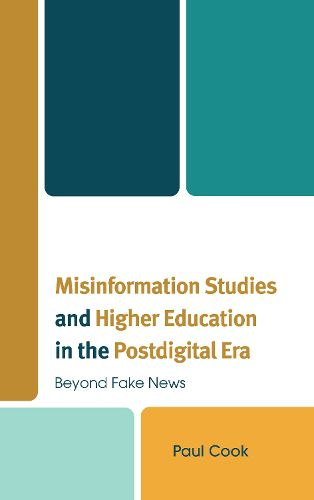Readings Newsletter
Become a Readings Member to make your shopping experience even easier.
Sign in or sign up for free!
You’re not far away from qualifying for FREE standard shipping within Australia
You’ve qualified for FREE standard shipping within Australia
The cart is loading…






In Misinformation Studies and Higher Education in the Postdigital Era: Beyond Fake News, Paul Cook argues that the epistemological complexity of the postdigital age demands a new, metadisciplinary approach to information and media - misinformation studies. Cook posits that institutions of higher education can work toward regaining the public's trust and reinvigorating general education programs by developing a metadiscipline that directly addresses the problem of misinformation in all its various and dangerous forms. This book outlines how such a curricular pivot may be accomplished in an age saturated with generative AI, algorithmic manipulation, ubiquitous networked computing, and information overload, coupled with the myriad challenges higher education faces from seemingly all sides. Ultimately, this book makes a compelling case that universities and colleges can instead harness the fragmentation caused by this 'perfect storm' currently facing higher education so they can not only weather the crisis, but also emerger stronger because of it.
$9.00 standard shipping within Australia
FREE standard shipping within Australia for orders over $100.00
Express & International shipping calculated at checkout
In Misinformation Studies and Higher Education in the Postdigital Era: Beyond Fake News, Paul Cook argues that the epistemological complexity of the postdigital age demands a new, metadisciplinary approach to information and media - misinformation studies. Cook posits that institutions of higher education can work toward regaining the public's trust and reinvigorating general education programs by developing a metadiscipline that directly addresses the problem of misinformation in all its various and dangerous forms. This book outlines how such a curricular pivot may be accomplished in an age saturated with generative AI, algorithmic manipulation, ubiquitous networked computing, and information overload, coupled with the myriad challenges higher education faces from seemingly all sides. Ultimately, this book makes a compelling case that universities and colleges can instead harness the fragmentation caused by this 'perfect storm' currently facing higher education so they can not only weather the crisis, but also emerger stronger because of it.